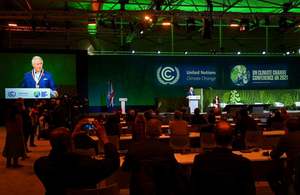UK announces funding for climate and the environment in the Middle East and North Africa
News story
UK announces £50m funding to support energy transition and green infrastructure and growth in the Middle East and North Africa

Minister for the Middle East and North Africa James Cleverly today announced £50m UK funding for the High Impact Partnership on Climate Action (HIPCA). The European Bank for Reconstruction and Development (EBRD) launched HIPCA on 2 November at an event during COP26 in Glasgow.
The EBRD-managed Partnership aims to unleash investments and solutions that reduce or prevent greenhouse gas emissions, strengthen resilience and reduce vulnerability to climate change, and protect the environment.
The UK’s funding will be used to mobilise private sector funds to support work across North Africa and the Middle East, including in Morocco, Algeria, Egypt, Tunisia, Jordan and Lebanon. This funding will be used to support energy transition and green infrastructure and growth in the region.
Announcing the funding at HIPCA’s launch event, Minister Cleverly said:
COP26 is not just about realising the climate commitments of individual governments, it’s about working together to enable all countries to meet global net zero targets and reduce the impacts of climate change. To do this we must unlock public and private investment and push for innovative and green solutions.
That’s why the UK is making a £50 million contribution to HICPA, whose work to mobilise funds and support green infrastructure projects in the Middle East and North Africa is vital for both economic growth and a greener future for the region.
Background:
- The EBRD’s new HIPCA partnership has been developed by the EBRD in collaboration with Austria, Finland, Netherlands, Switzerland, the Taiwan ICFD (International Cooperation and Development Fund) and the UK. It was launched on 2 November at an event at the MDB Pavilion at COP26.
- For further information about HIPCA, the launch event and speakers, see www.ebrd.com/news. The launch event will be livestreamed on the EBRD YouTube channel.
Published 2 November 2021
